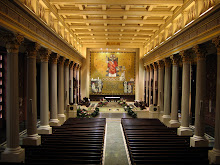Sts. Peter and Paul, Apostles
Inauguration of the Year of St. Paul
June 29, 2008, St. Mary, Hyde Park
Yes, the Church was founded by Christ himself, this much is non-negotiable. However, from the very beginning of his public ministry, he passed along the authority and leadership to a few select individuals who would carry on his message to the ends of the world.
Primary among these is St. Peter to whom Christ gave the keys of authority, as we hear about in our Gospel passage this morning. From the very beginning, he was always seen as the Prince of the Apostles, and when he spoke, the matter was settled. It is this authority that is passed down to us through the leadership of the Holy Father, the Pope.
However, as this is the year of the 2000th anniversary of St. Paul’s birth, Pope Benedict XVI has declared that for the next twelve months, we should focus on the life and ministry of this Apostle to the Gentiles, the great co-worker of Peter and whose preaching enabled to the Church to grow from a small segment of Judaism into her own worldwide dominance.
First, let’s take a look at his life and times. From his writings and from the legends that have been passed down to us, we learn that Paul was not born in the Holy Land, but rather in Tarsus, a city on the southern shore of Asia Minor, modern day Turkey. His mother was Jewish, his father was a Roman citizen, so unique among the Apostles, he too was a citizen of Rome. He was not just a scholar of the Law, but also knew the value of labor, for he worked as a tentmaker.
His early life was marked, however, by being a member of the party of the Pharisees, scholars of the Law who felt that if they followed the Mosaic Law perfectly, God would be forced to intervene in the life of the people Israel and re-establish the Kingdom. As such, ritual purity was vitally important to them. Hence, you can see the results that happen in Jesus’ interactions with the Pharisees, as they were concerned only with the externals and not with anything internal.
As can be seen from early in the Acts of the Apostles, it seems that St. Paul (or Saul at the time) was a leader in the party of the Pharisees as well, for his first appearance in the Scriptures us at the martyrdom of St. Stephen in Chapter 7 of the Acts of the Apostles. Those committing this crime ‘lay their cloaks at the feet of Saul.’
Despite this persecution of the Church, Saul (soon to be renamed Paul) is handpicked by Jesus to be the Apostle sent to the Gentiles, those who are outside of the Jewish covenant. On a trip to Damascus, north of Jerusalem, Paul is stopped by a blinding vision and a voice that calls him to repentance and to a new mission.
To say that he accepts this mission with his whole heart is an understatement! He becomes the most zealous of preachers of Christ, Crucified and goes forth to nearly the edge of the known world to make this message known. During his four missionary journeys, he writes prodigiously, exhorting those he has already met, and selling an orthodox, positive Christianity. His writings continue to shape what we believe today.
But what we gather to celebrate over the next twelve months as we celebrate this great Apostle is not just the life that he lead in bearing witness to Christ. It is much more than that. It is a special time to reflect on his writings, it is a special time to see in his life a model and paradigm for our lives here today, for the world which we find ourselves in today is not all that dramatically different than the world of St. Paul. It is hostile to the message of Christ, it is caught up in hedonism and pleasure and needs the message of salvation that is unique to the Christian message.
So, how do we emulate St. Paul in our world today? I think it is rather simple, actually: we must take for ourselves the same drive and passion that drove St. Paul to the ends of the world in service to the Gospel. Simply, to understand St. Paul, is to understand that he was driven by the simple statement: “Woe to me if I do not preach the Gospel!” Everything he did was guided by this simple proposition: “Woe to me if I do not preach the Gospel!”
I encourage, over the next twelve months, that we all need to take this simple maxim as a personal maxim: “Woe to me if I do not preach the Gospel!”
There are many ways that this could play out, but it will certainly not be boring to do so; for St. Paul’s life was anything but boring.
Over the next twelve months, read the Acts of the Apostles, read Paul’s letters, and embrace the challenge to live out the Gospel completely, courageously, dynamically in your life. You will be changed, dramatically, and life comes to a much deeper level of meaning.
Subscribe to:
Post Comments (Atom)






No comments:
Post a Comment